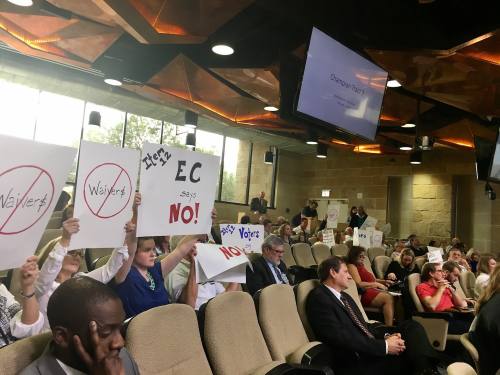A 300-unit multifamily project will get built on the Champion’s Tract after City Council narrowly approved a controversial zoning change, capping off a tense, two-year debate over the tract’s use.
City Council voted 6-5 to change the site's land use from general office to multifamily, paving the way for a 300-unit development at the corner of City Park Road and RR 2222. Council members Alison Alter, Leslie Pool, Ora Houston, Kathie Tovo and Ann Kitchen voted against the rezoning.
Alter, who represents District 10, has led the charge against the Champion's Tract's rezoning since a judge ordered the council to rehear and revote on the case because the city erroneously informed the public about the case’s details. Alter said she was disappointed in the result and apologized to neighbors for the “bizarre path” this case has taken.
Carol Lee—president of the Lake Austin Collective, a neighborhood group advocating against the 300-unit project—said the environmental waivers approved by City Council were problematic.
“We are very disappointed that [Austin Mayor Steve] Adler and the City Council bypassed their own regulations and public processes to grant these egregious entitlements,” Lee said in a statement. “This area serves all Austin residents and visitors with drinking water and recreational opportunities, and deserved more careful consideration for how it is developed.”
A brief history
Prior to the case, the city zoned the densely wooded and hilly property as general office following a court ruling in a 1996 settlement agreement. Planning and Zoning Department Assistant Director Jerry Rusthoven said in public testimony this meant a 100,000-square-foot office building could be built on the 45-acre tract.
The landowner, Champion Assets LTD, submitted a zoning change in 2015 to construct a 300-unit multifamily project on the land. In exchange, the developer said he would minimize the amount of concrete laid on the site and committed to using only 15 acres, conserving the other 30 acres as natural green space. The council agreed to the proposed project’s environmental superiority and approved it.
Immediately following the 2016 decision, the Champion's Tract was sold to 2222 Cap Texas LLC, which bought the land on the basis that the entitlements approved by the council would remain. However, after the sale, the city was sued and lost because of a posting error when the zoning case was advertised to the public. As a result, the council had to retake the case.
This time around, the council asked the Environmental Commission for help in deciding which prospective situation would be better for the environment—the 2016 zoning amendment originally approved by the council or the 1996 settlement agreement decided by the courts.
According to staff, the council’s decision in 2016 was best for the environment because the project was condensed and only took up 15 acres. If the 2016 agreement were rejected by City Council, the land’s development rules would revert to the 1996 settlement agreement.
A reversion to the 1996 settlement agreement would be worse than the 2016 agreement, according to commissioners, because the rules surrounding the development in the 1996 agreement predated many environmental policies that have been passed over the last 20 years. The rules of the tract were grandfathered in by the settlement agreement.
However, after public testimony and debate, the Environmental Commission not only rejected the 2016 zoning proposal but said the 1996 agreement was more detrimental to the environment and the city should not revert to those zoning rules. Thus, the commissioners said the council needed to renegotiate the zoning deal, which in the event of a rejection, the developer has no obligation to do and can revert to the 1996 agreement.
City Council’s narrow vote on Thursday closed the book on the drawn-out zoning case.





